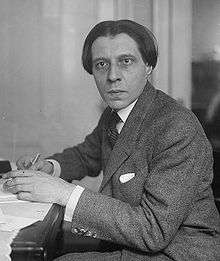Alfred Cortot
| Alfred Cortot | |
|---|---|
 | |
| Background information | |
| Birth name | Alfred Denis Cortot |
| Born |
26 September 1877 Nyon, Vaud, Switzerland |
| Died |
15 June 1962 (aged 84) Lausanne, Vaud, Switzerland |
| Genres | Classical music |
| Occupation(s) | Pianist, conductor |
| Instruments | Piano |
Alfred Denis Cortot (26 September 1877 – 15 June 1962) was a Franco-Swiss pianist, conductor, and teacher who was one of the most renowned classical musicians of the 20th century. He was especially valued for his poetic insight into Romantic piano works, particularly those of Chopin, Saint-Saëns and Schumann.[1]
Early life and education
Cortot was born in Nyon, Vaud, in the French-speaking part of Switzerland, to a French father and a Swiss mother. His first cousin was the composer Edgard Varèse.[2] He studied at the Paris Conservatoire with Émile Decombes (a student of Frédéric Chopin), and with Louis Diémer, taking a premier prix in 1896. He made his debut at the Concerts Colonne in 1897, playing Beethoven's Piano Concerto No. 3.
Between 1898 and 1901 he was a choral coach and subsequently an assistant conductor at the Bayreuth Festival. In 1902 he conducted the Paris premiere of Wagner's Götterdämmerung. He formed a concert society to perform Wagner's Parsifal, Beethoven's Missa solemnis, Brahms' German Requiem, and new works by French composers.
Career
In 1905, Cortot formed a trio with Jacques Thibaud and Pablo Casals, which established itself as the leading piano trio of its era. In 1907, he was appointed Professor by Gabriel Fauré at the Conservatoire de Paris, replacing Raoul Pugno. He continued to teach at the Paris Conservatoire until 1923, where his pupils included Yvonne Lefébure, Vlado Perlemuter, Simone Plé-Caussade and Marguerite Monnot.
In 1919 Cortot founded the École Normale de Musique de Paris. His courses in musical interpretation were legendary. For his many notable students, see here.
As a leading musical figure, Cortot traveled for many international music events. The French government sponsored two promotional tours to the United States, and one to the new Soviet Russia in 1920. He conducted several orchestras and was often called upon to provide piano accompaniment for touring artists when in Paris. Involved in music until his health failed, like Franz Liszt in his advanced years he taught master classes in piano.
On 21 March 1925, Cortot, working with Victor Records, made the world's first electrical recording of classical music: Chopin's Impromptus and Schubert's Litanei.[3]
World War II
During World War II Cortot supported the German occupation of France. He accepted the position of Haut-Commissaire ("High Commissioner") for arts in the Vichy government and served twice (1941 and 1942) as a member of the Vichy's Conseil national ("National Council").[4][5][6] He participated in official concerts in Paris during the occupation as well as in Germany in 1942.[4] After the war's conclusion, Cortot was found guilty by a French government panel of collaboration with the enemy and was suspended from performing for a year.[7] Once the suspension expired he returned to performing more than 100 concerts a season.[5]
Death
Cortot died on 15 June 1962, aged 84, of uremia from kidney failure in Lausanne, Switzerland.[1]
Bibliography
- Cortot, Alfred, La musique française de piano, 1930–48
- —, Cours d’interprétation, 1934 (Studies in Musical Interpretation, 1937)
- —, Aspects de Chopin, 1949 (In Search of Chopin, 1951)
Notes
- 1 2 "Alfred Cortot, Pianist, Is Dead. Soloist and Conductor, 84, Backed Vichy Regime". The New York Times. June 16, 1962.
- ↑ Varèse, Edgard; Jolivet, André (2002). Jolivet-Erlih, Christine, ed. Correspondance 1931–1965 (in French). Contrechamps. p. 110
- ↑ 40,000 Years of Music: Man in Search of Music - 144 Jacques Chailley - 1964 "On March 21st, 1925, Alfred Cortot made for the Victor Gramophone Co., in Camden, New Jersey, the first classical recording to employ a new technique, thanks to which the gramophone was to play an important part in musical life: electric ..."
- 1 2 'Alfred Denis Cortot', The Fryderyk Chopin Institut, accessed 13 January 2018.
- 1 2 David Dubal booklet to Nimbus Records release of Duo-Art piano rolls "Archived copy". Archived from the original on 16 May 2008. Retrieved 18 April 2008.
- ↑ France The Dark Years 1940–1944 by Julian T. Jackson, published in 2003 by Oxford University Press
- ↑ Chimènes, Myriam, ‘Alfred Cortot et la politique musicale du gouvernement de Vichy’ in La vie musicale sous Vichy, ed Chimènes (2001) ISBN 2 87027 864 0 , reviewed by Nigel Simeone, Musical Times, Vol. 142, No. 1876 (2001)
References
- Gavoty, Bernard, Alfred Cortot, 1977 (French)
- Manshardt, Thomas, Aspects of Cortot, 1994
External links
| Wikiquote has quotations related to: Alfred Cortot |
- Guide to Alfred Cortot Collection, 1491-1853 housed at the University of Kentucky Libraries Special Collections Research Center
- Recordings